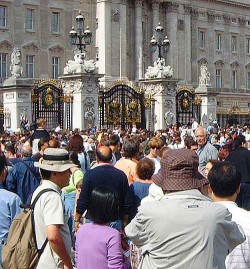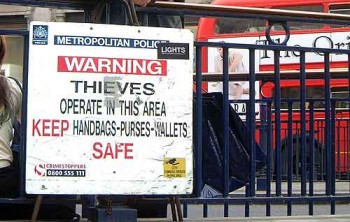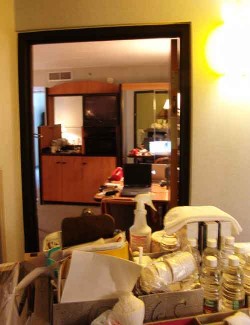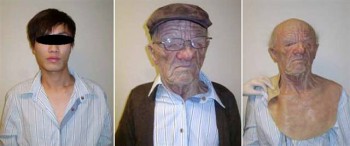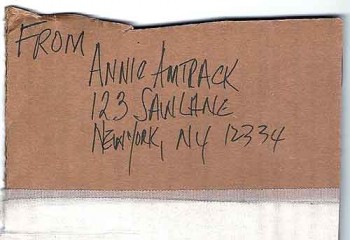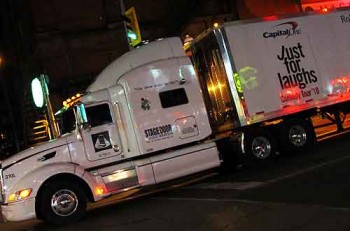How pickpockets take advantage of natural distractions
LONDON—Anthony Powell hovered on the fringes of Princess Diana’s funeral, lifting wallets from the handbags and pockets of devastated mourners. Princess Diana’s funeral! He edged up to his grieving marks as they waited in line to photograph the brilliant floral tributes piled against the Kensington Palace gates. Powell had a female accomplice to whom he passed his ill-gotten gains. She exchanged sorrowful glances with each intended victim before stuffing their cash and valuables into a bag suspended from her waist.
At 32 years old, Anthony Powell may have been at the height of his specious career. Or perhaps he’d have gone much further, making international “business trips” in order to attend major world events where pickings are plentiful.
Like all successful pickpockets, Anthony Powell knew the operating maxim put so succinctly by Detective Crawford of New York: distraction before extraction. It’s fair to assume that most of the funeral crowd were upset, distressed, and experiencing emotional turmoil. What a perfect milieu for a pickpocket.
In court, a witness described watching the thief “twitch his fingers like a gun fighter in a cowboy film” as he reached toward a mark’s bulging hip pocket. The observant citizen had used her cellphone to call police. She forfeited the formalities of the funeral and kept her attention on the pickpockets until the police arrived. The couple was arrested and found to be carrying a large amount of cash in sterling and at least ten foreign currencies, several wallets, and credit cards not in their names.
Their apartment in southwest London was searched later on that unfortunate September 6th, and the evidence was damning. Well over a hundred empty wallets were found, and under the mattress a rainbow of currency from around the world. With typical British understatement, it was suggested at the court hearing that the couple might, perhaps, have been practicing this activity even before September 6, 1997 at Princess Diana’s funeral.
What kind of human being could prey on distraught mourners at a funeral, I wonder. How heartless must one be to prowl and pilfer on such a heart-wrenching day of international sadness? Was the man entirely lacking in compassion? Was he deranged?
“Totally unscrupulous parasites,” a judge called Powell and his partner, as they were each sentenced to three years in jail.
Excerpt from Travel Advisory: How to Avoid Thefts, Cons, and Street Scams
Chapter Five: Rip-Offs: Introducing… The Opportunist
Japanese Breakfast
A thief at the theater
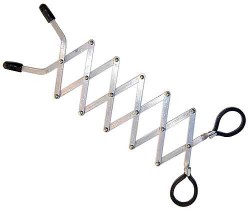
On a trip to London, Diane Breitman went to see the hit musical Mamma Mia at Prince Edward’s Theatre in Soho. She had seat #1 in a row near the front: the seat was all the way against the left wall. The row in front of Diane was empty; the row in front of that was occupied.
During the overture, a lone man took the seat directly in front of Diane. He irritated her by humming along with the songs, so she noticed him. He also moved a lot, first slouching back, then leaning way forward, back and forth. After a while, he got up and left, bent over so as not to block others’ views.
Some time later, the woman in front of Diane, two rows ahead and also in the seat against the wall, looked back. Shockingly for a lady at the theater, she clambered over the back of her seat and got into the empty row between her seat and Diane’s. She turned to Diane.
“Did you see the man who was sitting in front of you?”
“Yes, sort of.”
“He stole my wallet!” she hissed. “My purse was on the floor at my feet, against the wall. When I looked for it, it was under and behind my seat. I only noticed because I needed a tissue.”
What sort of thief would buy an expensive ticket to the hottest play in London? Possibly one who expected to collect many rich and neglected wallets. Could he have snuck in without a ticket? Highly unlikely. Prince Edward’s Theatre is one of the few with a security staff. Guards and video surveillance, however, only monitor the lobby and chaotic sidewalk area in front of the theater. My theory is that the perpetrator bought a ticket for pittance after the show had started, from one of the resellers who loiter in front of the theater. He may have changed seats several times, and stolen several wallets. There are no cameras inside the theater. Security officers acknowledged this incident but said reports like this one are extremely rare.
They may not be rare at the Mariinskiy Theatre in St. Petersburg, Russia, where our friend Vladimir had arranged to take us to see Verdi’s Forces of Destiny. Well-meaning Vladimir, who wanted to treat us, had purchased “Russian” tickets, which cost a fraction of “foreigner” ticket prices. At his suggestion, we stopped speaking English as we entered the theater and tried to effect gloomy Russian expressions, but ticket-takers instantly recognized us as foreigners and rejected our tickets. Vladimir was mortified. We tried to pay full price then, but didn’t have enough rubles and the box office didn’t accept American Express, the only card we had on us. Eventually Vladimir found a sympathetic ear and we were allowed to sneak in. He’d obtained excellent seats in the historic theater.
At intermission we mingled among the audience on the mezzanine, in the lobby, and in the stairwells. We were off duty, but Bob’s trained eyes leapt to a pair of thieves in the stairwell bottleneck. It was an ideal situation for them, and what opera-goer would be on guard inside the gold-leafed glory of the Mariinskiy?
“We have many theaters and museums in St. Petersburg,” Officer Alina Kokina told us in the St. Petersburg police station. “Pickpockets love to work inside them. They like to work on foreigners. They judge from a person’s appearance how much money there might be.” She paused. “To be a pickpocket was a prestigious profession during the war. Now they just do it out of desperation.”
Excerpt from Travel Advisory: How to Avoid Thefts, Cons, and Street Scams
Chapter Five: Rip-Offs: Introducing…The Opportunist
Hotel Oddity #12
Hotel room security lapses

When you check into a hotel and are handed a key to a room that turns out to be already occupied, you have to wonder about the hotel’s security. You definitely come to a conclusion about its competence. This is no small mistake, in my book.
When we checked into the Delta Bessborough in Saskatoon, we were given a room key, as usual. We hauled our luggage up to find that the room had not been cleaned. Down we went. Got a new key. Back up to another floor. Opened the door and found a woman inside! One more time down and up and we got a third room, this one a keeper.
I’m not terribly irked by the first mistake, but I find the second inexcusable. It makes me wonder who might barge into my room later. Will I be inside at the time? Just how confused is the front desk, anyway? How much responsibility will they take for potential repercussions?
Bob and I were surprised at how insignificant the front desk people seemed to deem the error. “I know, I know you got the wrong room, sir, we apologized!” a staffer said, as if we were harassing him. Inconvenience seemed to be the complaint he was addressing; not insecurity. And—he was busy with front desk things.
Contrast that with an incident the next day at a Crown Plaza. Our checkout time was 4 p.m. We returned to the room at 3 p.m. in a rush to pack, but couldn’t get in. Our two keys no longer worked. Hearing our distress at not being able to get in, a nearby service staffer came along with his master key and let us in, no questions asked. While we were irritated that our access had been wrongly cut off, we were grateful that someone was there to let us in, and we took advantage of his empathy. On the other hand, he was someone we’d never seen, and who had never seen us. Technically, he shouldn’t have let us in. That sort of behavior compromises the safety of guests and their belongings.
At checkout, I related the matter to the front desk staff because our keys should not have been cut off. “Wait,” the front desk man said. “Would you mind repeating that for our manager? He should be aware of this.” He got it. He understood the security ramifications. I have no doubt that the entire housekeeping staff got a refresher in security protocol.
A few days before, in another hotel, we actually entered the wrong room. Housekeeping was there and let us walk on in. We saw other people’s stuff and realized we were on the wrong floor. But we could have done anything. “Oh, I just wanted to grab my computer…”
I’ve already written about hotel security in the hands of housekeeping staff.
… the security of our belongings is in the hands of the maids. How well are they trained? How much discretion do they have? When should they break the rules in order to be nice? When should they bend the rules in anticipation of a nice gratuity? What about temporary workers during the hotel’s high season, do they receive as thorough training? How many of us have approached our room only to find that we forgot our key, or the key doesn’t work, and a nice service staff member volunteers to let us in?
Hotel policy is one thing; compliance is another. How do you react when you find that your key doesn’t work (for the third time), the front desk is far away (giant hotel), your feet hurt and your arms are full and you’re dead tired, and the maid with a master key says “I’m sorry. It’s for your own security.”?
At the Campanile hotel in Paris, we got a replacement key from reception just by asking for it, giving the room number only. They didn’t even ask for a name. The staff on duty were the morning shift; they were not there at our check-in late the night before. They simply had no security procedures in place whatsoever.
Bob and I have just stayed at 15 different Canadian hotels over the past 20 days. Without even looking, we found security lapses in three of them. Hotels: take note. Guests: beware. Hotel security: is there a workable protocol?
Masked man “swapped boarding pass”?
No reports expand on the claim that this ballsy Asian impostor “swapped boarding passes with a U.S. citizen and passenger who was born in 1955.”
What 55-year-old U.S. citizen would agree to swap boarding passes with a stranger? Unless the early-20s Asian wasn’t a stranger… Then why isn’t the 55-year-old accomplice mentioned as a suspect, along with the impostor?
Or was the “swap” accomplished by picking the pocket of the other guy? Couldn’t be easier to slip a boarding pass out of a pocket and replace it with another. But then what? The other guy passes through the gate agent’s boarding-pass-scan while neither he, nor the gate agent, realize the boarding pass isn’t his; he boards the plane, looks at the (swapped) boarding pass to see his seat number, and even now fails to notice someone else’s name on the pass?
MSNBC has posted a PDF of an alleged Intelligence Alert issued by the Canada Border Services Agency. The alert states “It is believed that the subject and the actual United States Citizen passenger … performed a boarding pass swap…” which to me implies that the U.S. passenger was a complicit performer of the swap. But who is this “actual United States Citizen passenger,” anyway? Something’s missing.
“Needed the money—sorry”
I’m happy to report a bag theft that ended with a smile.
Jay and Lyn Smith, of Tallahassee, took their 18-year-old son on his first trip to New York City. They took the train from the airport to Penn Station and rode the escalator up to street level.
Because they would be attending a family wedding, Lyn had brought some heirloom jewelry with her in a small purse, which she wore strapped across her back and in front of her. At the top of the escalator—classic!—the sandwich. Someone stalled at the top and a pile-up ensued, people squashing into people until the stall moved on.
That’s when Lyn’s bag must have been cut from her shoulder.
She cried, devastated by the loss of the sentimental pieces and angry with herself for having let this happen. As a former police investigator, she felt she should have known better.
Several months later a small box arrived via FedEx. The sender was identified in the top left corner as “Annie Amtrack.” Curious and mystified, Lyn and Jay opened the box. Inside was every item from Lyn’s stolen purse: her credit cards, her checkbook, the diamond bracelet and sapphire ring that had been her mother’s, her nail file, her shopping list—everything except the $300+ in cash she’d carried. All just dumped into the box.
There was also a note. Scrawled on the back of one of Lyn’s own checks, an apology: “Found on Amtrak. Needed the money. Sorry.”
The questions in this case are many; the answers are few. Did Lyn simply forget her purse on the train? (Not possible, she says.) Was it stolen on the train? On the escalator? Was “Annie” the thief, or did she merely find the thief’s leavings? If she was the thief, perhaps she was trying to balance her karma, like the muggers in Mumbai. As finder, should she have given the bag to Amtrak’s lost-and-found? As finder and returner, did she deserve to retain the cash for services rendered?
Your thoughts?
Regardless, Lyn was thrilled to have her belongings back. Now, she said, “my oldest daughter will one day have her grandmother’s ring!”
On touring
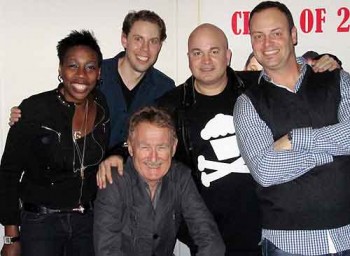
Bob and I are presently touring. It’s just three weeks across Canada—nothing long or exotic. We’re not roughing it, either. Well…15 cities in 21 days is a little rough.
We’re part of the Just For Laughs Comedy Tour—bringing raucous humor to large and small cities from east to west. The tour has been organized to the smallest detail with the dual goal of putting on fabulous shows almost every night and making it as easy and pleasant as possible for the artists. That means our hotel rooms are ready no matter how early we arrive. Keys are handed out without our needing to check in. Our frequent flyer numbers and hotel loyalty program numbers have been entered for us. We’re pre-checked in for flights, and cars, vans, and buses are always ready when we are.

When we get to each theater, our names are on the dressing room doors and our favorite snacks and drinks are backstage in the green room. Our own secure wifi network has been set up. The backstage ambiance is relaxed at first, but energy quickly builds as the comedians gear themselves up for their sets. Each has his or her own way of mentally preparing. One sings and does little dance steps. One reviews notes. One snipes at anyone he sets eyes on, warming himself up. And one doubles over with stomach cramps from anxiety. Each is a seasoned professional and hits the stage in attack mode, ready to tear the audience apart.
New to Canada, we never know what to expect as to theater or audience demographic. It’s fun to experience the differences. The theaters range from beautiful, old, traditional ones like the Capitol Theatre in Moncton, New Brunswick, to the big beer-barn of Centennial Hall in London, Ontario, to the enormous Massey Hall in Toronto. Our audiences, from 800 to 3,000 people each night, have paid to see us and are therefore vastly different from the corporate attendees who basically challenge us with “go ahead—prove yourself.”

We’re no strangers to life on the road. 200 to 250 nights a year in beds not-our-own, for the past 17 years is the experience I speak from. This tour is high-intensity-travel.
We’re in a different hotel every night or two. After the third or fourth hotel, I lost track of our room number and now make notes for my pocket every day. Yesterday we actually entered the wrong room. Housekeeping was there and let us walk on in. We saw other people’s stuff and realized we were on the wrong floor. Such a weakness in hotel security. We keep the do-not-disturb sign on our door.
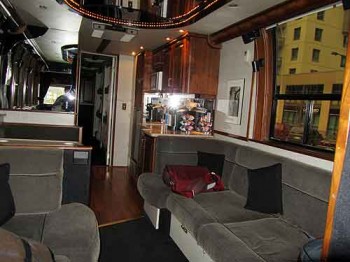
Road food is tiresome. We want a breakfast better than Starbucks, but not as big and bland as hotel buffets. We found a good restaurant chain for breakfast, then got sick of it. It’s a struggle to find an independent restaurant or diner we can walk to with so little time to spare. Dinners are mostly impossible. We leave for the theater at 5:00 or so, and are busy until 10 or later—exactly restaurant dinner hours in all but the biggest Canadian cities. We usually manage a decent lunch; sometimes very good ones. Since we stay in city centers, we must usually be sure to go for lunch before the joints close up at 2 pm.
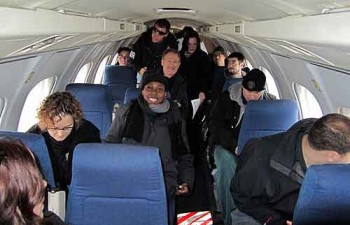
Mostly, we fly from city to city. We’ve also traveled by tour bus, the big comfortable kind with sofas, bunks, kitchen, bathroom, and internet. Between Prince Edward Island and Halifax, we took a private chartered jet.
While we were flying among the Maritimes, all the tour gear and sets also flew, or was driven overnight. We used smaller, packable sets and limited sound and light equipment. Now we have an 18-wheeler that carries the huge Just For Laughs set pieces, sound, lighting, catering, and office. I can’t imagine what’s in the many, many trunks that are unloaded every day and packed up at the end of each city’s gig.
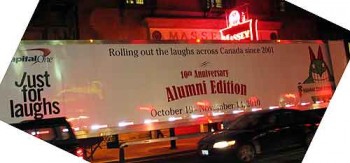
For us, it’s important to have packed every thing we want or need, but nothing else. Packing every single morning makes you think about what you really want to unpack. What you really want to unpack varies vastly from person to person. Especially from Bob to me. I am the minimalist in our family. He brought his espresso machine. Touring in cold weather is an extra complication, having to look after such easily losable items as gloves and scarves.
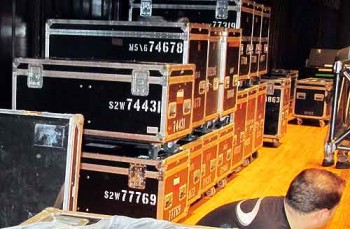
We thoroughly enjoy the company of the other comedians in the show, as well as the staff and crew. We don’t sense any of the competitiveness or jealousy common among magicians. From our perspective, the mix of personalities on this tour is harmonious, and the beginning of lasting friendships.
Publicly accusing hotels of theft
Before a lengthy stay in a certain hotel in Italy this summer, I searched for reviews of it online. Among the raves on TripAdvisor, I found one review that loudly accused the hotel staff of stealing cash from a room safe. Not only that, the writer asserted that he had discovered that other rooms on the same floor had been targeted in the past.
Hotel management immediately addressed the allegation online but, not being fluent in English, did little to ameliorate the hotel’s reputation. The damage had been done, and the accusation remains online for potential visitors to consider.
“Hoteliers Look to Shield Themselves From Dishonest Online Reviews,” wrote The New York Times on October 25.
Although TripAdvisor does allow property owners to post responses to reviews, some hoteliers want the site to monitor comments more actively and take action when managers express concerns, especially when reviews border on libel.
…
Chris Emmins, a founder of KwikChex, a British reputation management company [is] seeking to organize a lawsuit against TripAdvisor on behalf of its clients.Mr. Emmins said more than 800 businesses had inquired about participating in the case, but he expected only a few dozen would meet the criteria the company hoped to test, including the legality of reviews that accuse hotel staff of theft, assault or discrimination.
“I don’t think they belong on a review site,” he said. “They’re allegations of criminality.”
Before visiting the Italian hotel, I hatched a plan to booby trap the room safe, just to see if it was opened during our stay. You know—research. Upon arrival though, I gave up the idea. The place had nothing of a dodgy feel. If a safe theft had happened there, I’m convinced that it was an anomaly. During high season, many hotels take on extra short-term help, and some may be lax with background checks. But the question remains: was there really a theft at all?
Example: Back in March, Bob and I were in the lobby of our hotel in Mumbai when a guest strode up to the reception desk and accused hotel staff of stealing her iPod from a tote bag in her room.
“Wait a minute,” Bob butted in, and began grilling her. When had she last seen the iPod? Where had her bag been? Had it been zipped? in the control of others? accessible on the plane? handled by a taxi driver? By the time he was finished, the woman realized there had been many earlier opportunities for the theft and apologized to the hotel manager. Had she made her accusation online, the blot would remain, hurting the hotel, true or not, indefinitely.
Because we give presentations on theft, people constantly tell us their experiences as victims. It often seems to us that there’s quite a bit of conclusion-jumping. A few direct questions, as above, spur the victims to rethink the circumstances surrounding the disappearances of their valuables and reconsider where the blame should lay.
![]()



